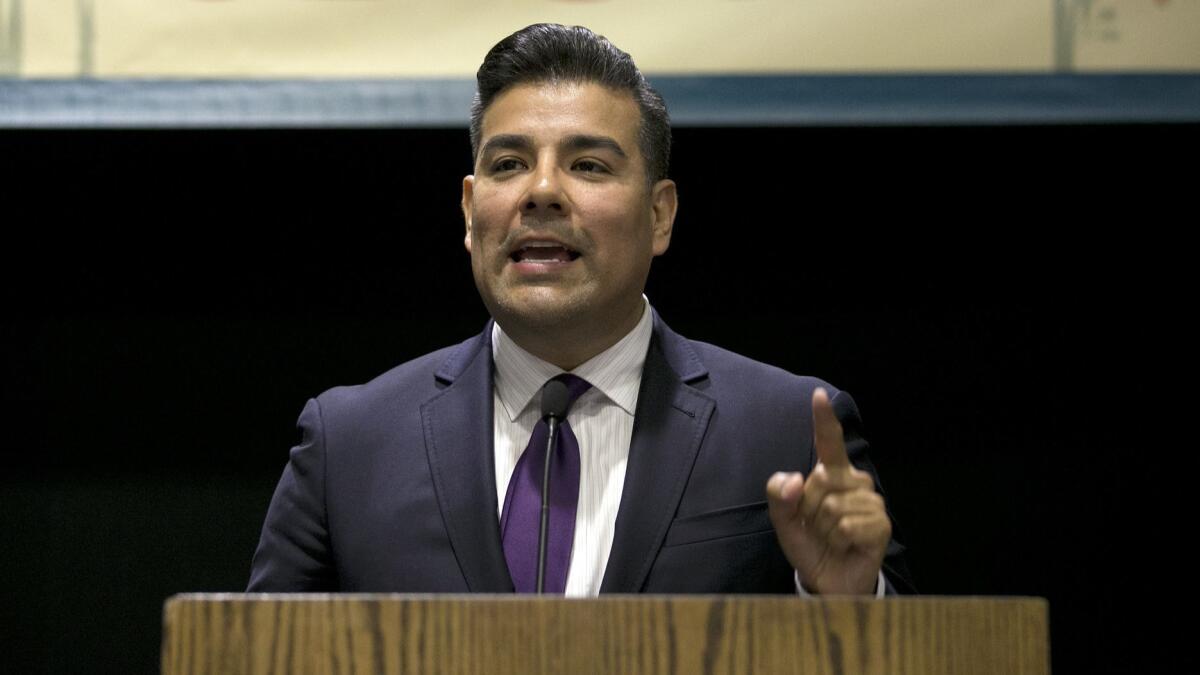Editorial: Troubling behavior from California’s Insurance Commissioner Ricardo Lara

- Share via
It is not illegal for California’s insurance commissioner to accept campaign donations from insurance company executives and lobbyists. But it’s unseemly enough that most people running for the post have refused such donations to avoid raising suspicions about industry influence. The insurance commissioner’s job, after all, is to regulate the $310-billion industry, keeping insurance available and affordable by overseeing the companies’ rates and practices.
One notable violator of this unwritten rule was Insurance Commissioner Chuck Quackenbush, a Republican who not only accepted donations and gifts from the industry, but did so with gusto. During his six years in office, Quackenbush collected $8 million in campaign donations from insurance companies, as well as industry-financed trips to London, Beijing and other places, before slinking out of the job in disgrace in 2000 after a whistleblower accused him of using the job for personal gain.
And now there’s another: Current Insurance Commissioner Ricardo Lara received more than $53,000 in campaign donations for his 2022 reelection from people linked to an insurance company with business pending before the commissioner, according to a San Diego Union-Tribune investigation.
Lara says he gave that money back. But then, after he took office, his reelection campaign collected insurance industry contributions.
Lara, a Democrat, promised not to take money from the industry during his tough campaign against Steve Poizner, a former Republican insurance commissioner running as an independent. It was a wise move considering that the last Democrat to lose a race for insurance commissioner was former Lt. Gov. Cruz Bustamante, whom Poizner defeated in 2006. Bustamante had received campaign help from the insurance companies. Poizner had not, and furthermore, showed himself to be a champion of the public’s interest while on the job.
Lara beat Poizner in November even though Lara violated his own pledge not to take insurance industry contributions during the campaign. Lara says he gave that money back. But then, after he took office, his reelection campaign collected insurance industry contributions, something Lara acknowledged only after being called out.
This week Lara said it was just a mistake attributable to insufficient campaign controls, and promised once again to return the money. But that’s not good enough. He must explain how these donations were made and what he knew about them. It’s very difficult to believe that Lara, who was acting as his own campaign treasurer, didn’t know the provenance of the contributions, given that they represented most of the donations to his campaign fund.
Enter the Fray: First takes on the news of the minute »
The issue raised by Lara’s actions is part and parcel of a bigger debate in society about the corrosive effect that campaign donations from special interests can have on policymaking and on the public’s faith in its elected officials. Obviously, we don’t want legislators or regulators to be bought by or beholden to donors. On the other hand, restricting donations from executives and corporations raises 1st Amendment issues, even when they have a financial interest in the outcome of the campaign. The constitutional limits have left reformers struggling to keep outsiders from trying to buy off elected officials and to maintain public confidence in government.
The appearance of undue influence is a problem that afflicts every elected position to a degree. But what makes the state insurance commissioner’s position different from, say, secretary of state or a state senator is that it is a single-industry regulator created by a citizen’s initiative in 1988: Proposition 103. The ballot measure grew out of a frustration with the skyrocketing rates for auto and health insurance and the sense that the state’s appointed insurance commissioners were too cozy with insurance companies to adequately regulate them.
At the time of the Quackenbush scandal, some state lawmakers sought to restrict industry campaign donations to the insurance commissioner. A bill by then-state Sen. Jackie Speier, a Democrat who is now a congresswoman, would have limited donations from companies that have regulatory proceedings before the commissioner to just $250 within a 12-month period. The bill never passed, but it was a good idea then and still is. If Lara wants to redeem himself, he would be wise to advocate for similar limits. That would make it harder for him to accidentally keep violating his own pledge.
Follow the Opinion section on Twitter @latimesopinion and Facebook
More to Read
A cure for the common opinion
Get thought-provoking perspectives with our weekly newsletter.
You may occasionally receive promotional content from the Los Angeles Times.










